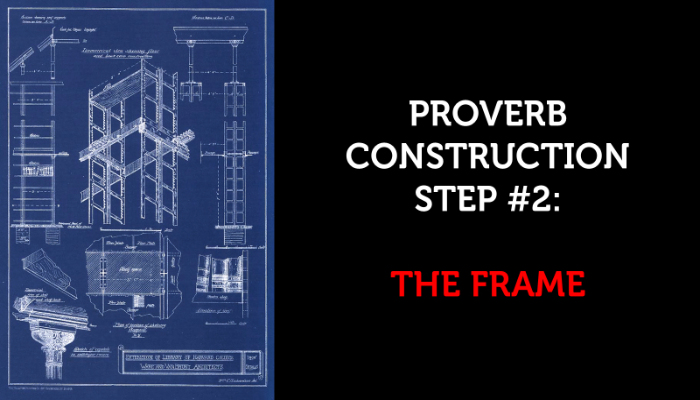
All written works consist of form and function. Since form is more complicated than function (see last post), we’ll need to spread our discussion about it across a few posts.
Proverbial form is split into two major pieces: frames (the structure by which we build our proverbs) and finishes (the techniques used to gussy ’em up). Today we cover frames.
Frames come in four categories: Metaphor/Definition, Comparison, Conditional, and Special
1. Metaphor/Definition
Metaphor is the building block of all proverbs, thus it deserves its own frame category. Proverbs built upon metaphor/definition frames include:
- time is money
- ignorance is bliss
- a diamond is forever
2. Comparisons
Comparison frames juxtapose certain roles, events, and influences to make a point. They frequently contain qualifying terms such as better, best and worse:
- It’s better to have loved and lost than have to have never loved at all
- Old friends and old wine are best
- False friends are worse than open enemies
3. Conditionals
Conditional frames establish situational advice. They typically contain setup words like if and when:
- If the shoe fits, wear it
- If you lose your temper, don’t look for it
- When EF Hutton speaks, people listen
4. Special Frames
And lastly, a subset of frames exists that may contain metaphor/definition, comparison, or conditional elements, but do so uniquely. There are two special frame subcategories: derivatives and implied.
4a. Derivative (Special)
Derivative proverbs are built upon well-established sayings and cultural references, thus they come spring-loaded with memorability. Many carry humor which lowers the barrier to listener adoption and increases the likelihood that the proverb will be repeated. My favorite derivative proverb results from the combination of two other proverbs:
A rolling stone gathers no moss + open mouth insert foot = a closed mouth gathers no foot
My storytelling buddy Park Howell used an iconic song as a derivative frame to form:
a spoonful of story helps the data go down
(Can’t ya just hear Julie Andrews singing it?)
4b. Implied (Special)
Finally, while all proverbs are based in metaphor and formed upon frames, sometimes those frames get eliminated during the editing process. For example, let’s take the proverb no pain no gain. Note the absence of telltales for comparisons (better/best/worse) nor conditionals (if/then/when). Does this mean that the proverb has no frame?
We’ll dive deeper into this topic when we talk about finishes, but proverb creators start with a big idea, determine a function and a frame, and then iterate through an editing cycle to make the proverb more memorable and repeatable. Sometimes this process eliminates telltales (better/best/worse/if/then/when) while simultaneously leaving behind cognitive references to them.
For example, perhaps the first incarnation of no pain, no gain read: If you want to gain, you must experience pain before some sharp copy editor chopped those nine words to four. And although the proverb lost its conditional telltale (if), cognitive frame references remain in the minds of both speaker and listener. The speaker implies the conditional frame while the listener infers it.
Now it’s your turn. Examine your favorite proverbs. Can you determine their functions and frames? The better you are at deconstructing existing proverbs, the better you’ll be with creating your own.
If you want to learn more about proverbs, grab a copy of The Proverb Effect on Amazon.com.
Photo Credit: Extension of library of Harvard College, Iron details. Ware and Van Brunt architects / Wm. C. Richardson, del. Cambridge Massachusetts, 1878. Boston: Heliotype Printing Co. Photograph. https://www.loc.gov/item/2007682661/
